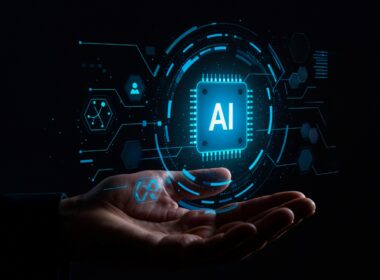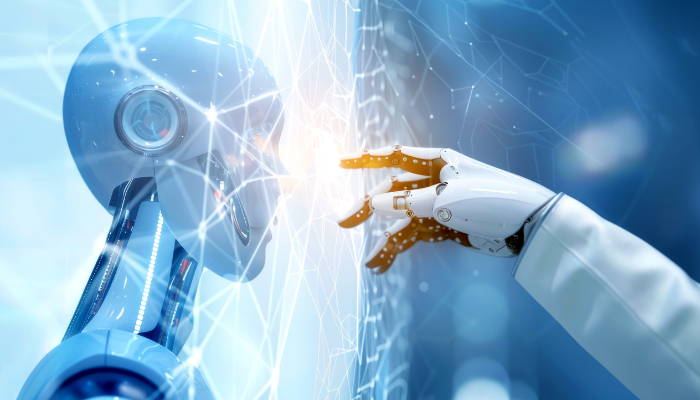As a business leader, you know that time, cost, and quality are critical to staying competitive in today’s market. However, the traditional software development process often comes with delays, high costs, and the risk of human error. These issues can delay product launches, raise operational costs, and prevent you from meeting ever-growing demands of the market.
AI-augmented development directly tackles these challenges. By integrating AI into your development process, you can speed up delivery times, reduce costly errors, and improve product quality. AI automates repetitive tasks like coding, testing, and system optimization, allowing your team to focus on more important work. This means quicker releases, fewer mistakes, and ultimately, products that are ready to meet customer needs faster.
In this blog, we will show you how AI-augmented development is addressing these core issues and how it can help you deliver high-quality solutions faster, reduce costs, and increase collaboration across your teams.
What is AI-Augmented Development?
AI-augmented development integrates artificial intelligence into the software engineering process to enhance the capabilities of developers. Rather than replacing developers, AI acts as an assistant by automating repetitive tasks, suggesting code improvements, and identifying potential errors early on.
The AI-augmented software engineering market was valued at USD 2.1 billion in 2023 and is expected to grow to USD 26.8 billion by 2030, with an annual growth rate of 37.5% from 2024 to 2030. This significant growth shows how businesses are increasingly relying on AI to make software development faster and more efficient. From coding to testing and deployment, AI helps improve every part of the development process.
By integrating AI tools, businesses can free up time spent on manual tasks, enabling teams to focus on more strategic aspects of product creation.
As AI continues to evolve, the benefits it brings to software development are becoming increasingly clear. Let’s take a closer look at how AI-augmented development can make a real impact.
Key Benefits of AI-Augmented Software Development
AI-augmented software development is transforming how developers build, test, and deploy software. By streamlining tasks and improving accuracy, AI brings a host of advantages that speed up development and enhance the overall quality of software.
Let’s explore the key benefits businesses can expect from integrating AI into their development processes.
1. Fast Development Cycles
Software development is often time-consuming. With manual coding, testing, and debugging, projects can take longer than expected, delaying time-to-market and impacting your ability to respond to business needs.
AI-powered tools automate repetitive tasks like coding, testing, and error detection, speeding up the development process. This allows your team to focus on higher-value tasks, cutting down development time and getting your products to market faster. With AI, you can launch products quicker and stay ahead of competitors.
2. Improved Accuracy and Fewer Errors
Human error is inevitable, and bugs often slip through the cracks. When these issues are discovered later in the process, they can be costly to fix and impact your brand’s reputation.
AI can catch bugs and inconsistencies early in the development process. Tools like Selenium and Appium perform automated tests across different devices and platforms, ensuring that your software works seamlessly before it’s released. This leads to fewer bugs, smoother user experiences, and less time spent on post-launch fixes.
3. Better Decision Making and Resource Allocation
Without clear insights, it’s hard to allocate resources effectively and make informed decisions about the development process. Poor decision-making can lead to wasted time and increased costs.
AI helps you make smarter, data-driven decisions by analyzing historical data and predicting potential risks. With AI tools, you can optimize workflows, allocate resources efficiently, and make informed decisions in real-time. This ensures that your projects run more smoothly and that resources are used effectively.
4. Low Operational Costs
Manual work, repeated testing, and lengthy development cycles can quickly rack up costs. These expenses can eat into your budget and affect your bottom line.
AI tools automate labor-intensive tasks, reducing the need for extensive manual intervention. By identifying issues early and preventing costly mistakes down the line, AI helps businesses save money on both development and post-launch fixes. As a result, operational costs are reduced, and your budget is better managed.
5. Better Team Collaboration and Coordination
Teams working in silos or without clear communication can lead to inefficiencies, delays, and confusion about project goals and deadlines.
AI tools streamline communication across development teams, making it easier for everyone to stay aligned. With AI, project management becomes more efficient, as tasks are automated, progress is tracked, and team members can collaborate more effectively. This leads to faster development cycles and a more cohesive team environment.
6. Scalability for Growth
As your business grows, so do your software needs. Managing increased complexity can strain resources and slow down development, especially if your systems aren’t equipped to handle larger projects.
AI can help businesses scale their software development without sacrificing quality. With AI, managing large datasets, handling multiple projects, and adapting to growing demands becomes easier. AI tools can automate and optimize tasks, allowing your team to keep up with increasing workloads and scale efficiently as your business expands.
Tired of long development cycles and wasted resources?
We use Selenium for efficient automated testing, Appium for mobile app testing, and custom automation scripts to quickly identify issues, improve accuracy, and accelerate development.
Having covered the core benefits, let’s now take a look at the AI-driven tools that are transforming software development and enabling these benefits.
AI-Driven Tools and Technologies in Software Development
AI is powered by a range of innovative tools designed to enhance the development process, making it faster, more efficient, and error-free. Here are some of the most impactful tools you should know about:
1. GitHub Copilot
GitHub Copilot is an AI-driven code completion tool that helps developers write code faster and with fewer errors. It suggests entire lines of code or even entire functions based on what the developer is working on.
Key Features:
- Contextual Code Suggestions: GitHub Copilot understands the context of your code and provides relevant code suggestions.
- Supports Multiple Languages: It supports a wide range of programming languages, making it versatile for diverse projects.
- Improves Developer Productivity: By suggesting complete code blocks, Copilot saves developers significant time.
- Reduces Repetitive Coding: Automates repetitive coding tasks and accelerates the development process.
- Continuous Learning: It learns from your code and adapts to your coding style over time.
2. Tabnine
Tabnine is another powerful AI tool designed to assist developers with code completion. It integrates seamlessly with your IDE, providing intelligent suggestions to boost productivity.
Key Features:
- Code Predictions: Tabnine predicts the next lines of code based on previous input, enhancing workflow.
- Context Awareness: It learns from your codebase and development environment to offer precise suggestions.
- Language Support: Works with multiple languages like Python, JavaScript, Java, and more.
- Real-Time Suggestions: Provides real-time, context-based code completions to speed up coding.
- Increases Accuracy: Helps reduce errors by providing accurate code recommendations.
Also Read: Top AI Frameworks and Libraries to Learn
3. Codex
Codex, developed by OpenAI, is an AI model that translates natural language into code. It enables developers to write code based on plain English descriptions, which can be particularly helpful for non-technical stakeholders.
Key Features:
- Natural Language to Code: Codex converts instructions written in natural language into executable code.
- Multiple Language Support: It works with a wide array of programming languages, including Python, JavaScript, and Go.
- Context-Aware: Codex understands the context of your request and generates appropriate code snippets.
- Enhanced Collaboration: Allows non-technical team members to interact with the codebase by describing requirements in simple language.
- Improves Development Speed: Reduces the time needed for coding, especially for complex tasks or new languages.
4. Selenium and Appium
Selenium and Appium are AI tools focused on automating web and mobile application testing. These tools are essential for ensuring that your software runs smoothly across multiple platforms and devices.
Key Features:
- Cross-Platform Testing: Both tools allow testing on different browsers and mobile platforms.
- Automated Regression Testing: Automatically tests software after every update, ensuring no bugs are introduced.
- Support for Multiple Languages: Works with languages like Java, Python, and JavaScript.
- User Interaction Simulation: Can simulate user interactions with your app, providing valuable insights into how it behaves.
- Faster Issue Detection: Helps catch bugs early in the development process, reducing post-launch issues.
5. Postman
Postman is a popular tool for testing and automating API interactions. It’s used to ensure that APIs work properly and data flows seamlessly between systems, an essential part of any software stack.
Key Features:
- API Testing Automation: Automates testing of API endpoints, ensuring they function correctly.
- Data Validation: Validates that the data is transferred correctly between systems via APIs.
- Error Detection: Detects errors in API responses, helping developers fix them before deployment.
- Performance Testing: Helps test the performance and response times of your APIs under various conditions.
- Collaboration Tools: Enables team collaboration by sharing collections and environments for API testing.
Also Read: Top Services That IT and Software Development Companies Provide
Use Cases of AI Augmentation in Software Development
AI is reshaping software development by accelerating workflows, improving code quality, and reducing repetitive effort. Here’s how AI is actively enhancing the development process:
Faster Code Generation
AI can suggest code snippets or auto-complete entire functions based on context, reducing time spent on boilerplate code. For example, while developing an e-commerce app, AI can instantly generate payment gateway integrations or API calls, letting developers focus on core business logic.
Proactive Bug Detection
Instead of relying solely on manual reviews, AI scans code in real time, flagging security vulnerabilities, logic errors, or inefficiencies before they escalate. This cuts down costly post-release fixes and ensures higher code reliability.
Smarter, Adaptive Testing
AI monitors code changes and auto-generates relevant test cases, adjusting coverage based on recent updates. It can even predict areas most likely to fail, streamlining testing without sacrificing thoroughness.
Predictive Project Management
By analysing past sprint data, AI forecasts delivery risks, bottlenecks, and delays, enabling teams to proactively adjust scope or resources before problems occur.
Efficient, AI-Assisted Code Reviews
AI augments code reviews by instantly spotting deviations from coding standards, security risks, and performance issues, reducing review cycles while improving overall code health.
Let’s understand the challenges while implementing these uses of AI in software development.
Challenges in AI-Augmented Software Development
While AI-augmented development presents significant opportunities, it’s important to recognize that integrating AI into your software development process comes with its own set of challenges. Here are some of the common obstacles businesses face when adopting AI tools in their development cycles:
While AI-augmented development offers great potential, businesses must address several challenges when integrating AI into their software processes. Here are the key obstacles:
1. High Initial Investment
AI tools and infrastructure can be expensive, especially for small businesses, as they require both costly software and skilled personnel, which can make adoption difficult.
Solution:
- Start with targeted AI solutions, like automated testing or code completion tools, which offer significant value at a lower cost.
- Consider cloud-based AI tools with subscription models to scale without large upfront investments.
2. Data Privacy and Security Concerns
AI needs large datasets, often containing sensitive information, which can raise privacy concerns. It’s important to ensure these systems comply with regulations like GDPR or CCPA to maintain security.
Solution:
- Opt for AI tools built with data security features, like encryption and compliance features.
- Implement robust data governance policies and continuous monitoring to prevent breaches.
3. Lack of AI Expertise
Finding skilled professionals with expertise in AI and machine learning is challenging. Additionally, training existing staff on AI tools can take time and impact short-term productivity.
Solution:
- Upskill your existing team with affordable online AI and machine learning courses.
- Partner with AI consultants or experts for initial guidance and implementation.
4. Integration with Legacy Systems
Legacy systems often don’t work well with AI tools, making integration complex and time-consuming. Updating existing infrastructure to include AI can be expensive and disruptive.
Solution:
- Look for AI tools that complement existing infrastructure, such as AI-powered assistants or code completion tools.
- Start with gradual integration to avoid disrupting business operations.
Also Read: Exploring Top AI Development Companies
5. Trust and Explainability Issues
AI’s decision-making can be unclear, creating trust issues, especially in high-stakes industries. Stakeholders may be skeptical if they don’t understand how decisions are being made.
Solution:
- Choose AI tools that prioritize explainability, offering transparency in how decisions are made.
- Educate stakeholders on how AI models work to build trust and reduce skepticism.
6. Ethical Considerations
AI models can reinforce biases if not properly trained, leading to unfair decisions. There are also concerns about AI replacing human jobs, especially in tasks driven by automation.
Solution:
- Establish an AI ethics framework that focuses on bias prevention, fairness, and transparency.
- Regularly audit AI models for ethical use and fairness, ensuring no group is unfairly disadvantaged.
7. Maintaining Human Touch
Over-relying on AI can result in a loss of creativity and emotional intelligence that human developers bring. It’s important to balance AI with human input to maintain innovation and create personalized experiences.
Solution:
- Use AI to handle repetitive tasks, allowing human developers to focus on creative problem-solving and user-centered design.
- Foster collaboration between AI tools and human developers to maintain a balance and encourage innovation.
Struggling with high costs and delays in AI development? We help reduce expenses, speed up delivery, and integrate AI seamlessly into your existing systems.
Contact us today to accelerate your development
Also Read: Steps for Successful AI Implementation Strategy in Your Business
The Future of AI-Augmented Software Development
As technology advances, so too will the role of AI in software development, opening up new possibilities and reshaping how we build, test, and maintain software.
Here’s a glimpse into what the future holds:
AI-Driven End-to-End Development
AI will manage the entire software lifecycle, from design to deployment. It will predict potential issues, generate code from natural language, and suggest improvements in real-time, making development faster and reducing human errors.
Self-Evolving Software Systems
AI will enable systems to fix and improve themselves automatically. These systems will learn from user behavior, identify problems, and apply updates or fixes without needing human intervention, making software more adaptable.
Hyper-Personalization of Applications
AI will analyze user data to customize software in real-time, offering a more personalized experience for each user. This will help businesses create products that meet user needs more accurately, improving customer satisfaction and loyalty.
Smarter AI for Decision-Making
As AI tools get smarter, they will help developers make better decisions by predicting trends and behaviors. This will allow developers to make more informed choices, improving product development and resource allocation.
Collaborative AI and Human Teams
The future of AI in software development is about teamwork. AI will work alongside developers, handling repetitive tasks and providing insights, so developers can focus on more creative and complex tasks, leading to faster and more innovative development.
Improved Security and Risk Management
AI will help identify security risks and vulnerabilities in real-time. AI-driven tools will monitor systems, predict threats, and automatically take action to protect software, improving overall security.
Seamless Integration Across Systems
AI will allow different development tools and platforms to work together smoothly, breaking down barriers between teams and improving collaboration. This will make the development process more efficient and the end product of higher quality.
As we look to the future of AI-augmented software development, it’s clear that businesses need a partner who not only understands the technology but can also navigate the complexities of integrating AI effectively into the development lifecycle. That’s where Codewave comes in.
With our deep expertise in AI-driven software development, we are uniquely positioned to help your business harness the full potential of AI to accelerate growth, reduce costs, and innovate faster.
Why Choose Codewave as Your AI-Augmented Development Partner?
Here’s why Codewave is the right partner for your AI-augmented development journey:
- AI-Driven Custom Software Development: We specialize in building customized software solutions that integrate AI at every level. From automating repetitive tasks to enhancing decision-making, our team ensures that AI is seamlessly embedded into your product, enhancing both performance and user experience.
- AI & ML Development and Integration: Get valuable insights and improve your business strategies with our AI and machine learning solutions. Whether you’re building new systems or working with older ones, we help you integrate AI and machine learning smoothly into your existing setup. By analyzing large data and providing predictions, we make sure AI works alongside your current systems, making everything run more efficiently and reducing any hassle.
- AI-Powered Automation and Process Optimization: Codewave helps automate key processes across development, testing, and deployment, drastically reducing operational costs and freeing up your team to focus on higher-value tasks. With AI-driven tools, we ensure faster development cycles and fewer errors, improving the overall quality of your products.
- AI-Powered Security Solutions: Security is at the core of any successful AI-augmented system. Our team integrates AI-powered security measures to identify vulnerabilities, predict potential threats, and take proactive steps to safeguard your software.
- Generative AI Development: Leverage the power of generative AI to create content, designs, and solutions tailored to your needs. Whether it’s for automated content generation or innovative product designs, we help your business push the boundaries of creativity and efficiency with AI.
Curious to see how we’ve helped businesses transform with AI? Check out our portfolio to see the results.
Conclusion: Embrace the Future with Codewave
The future of AI-augmented software development is filled with incredible potential. By partnering with Codewave, you gain access to expert solutions that not only address the current challenges of software development but also position you at the forefront of tomorrow’s technology landscape.
With our AI-driven tools, custom solutions, and hands-on support, we are the right partner to help you navigate the future of development.
Contact us today to get started!
Codewave is a UX first design thinking & digital transformation services company, designing & engineering innovative mobile apps, cloud, & edge solutions.







